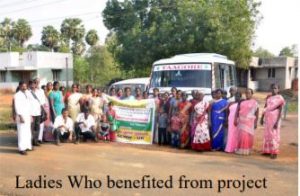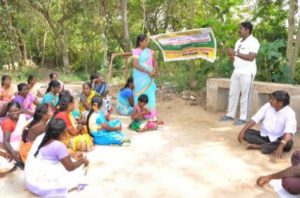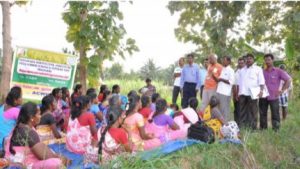The ACWW Project 1007 (Promotion of Indigenous Rice and Vegetables Cultivation among Marginal Women Farmers and Prevent their Migration to Towns) has been fully funded.

COUNTRY: India
SOCIETY: Success Trust
PROJECT: Promotion of Indigenous Rice and Vegetables Cultivation among Marginal Women Farmers and Prevent their Migration to Towns
PROJECT NO: 1,007
ACWW GRANT: £4,066* (donation received; amount now required: £3,996)
The aim of this project was to promote indigenous rice and vegetable crops through sustainable farm methods among marginalised women in Pudukottai district, Tamil Nadu.
MONITORING REPORT SUMMARY
ACWW Resource Person Elizabeth Swamy visited this project and reports that this organization uses rented offices and has rooms for activities such as training in computers, agricultural practices and others. The Trust has received help from other agencies such as
Water for Humanity, USA, to dig bore wells, and Share the Global Resources – Quakers USA, in the past.
Elizabeth found that the 40 women beneficiaries had been given motivational training regarding the project; they had then been given training in the preparation of natural manure and pesticides. They had started to prepare these, using earthworms, storage drums and other materials.
Indigenous varieties of rice seed and vegetable seeds had been distributed and the beneficiaries were preparing the fields to sow the seeds. It had been raining for a week at the time of Elizabeth’s visit, so the conditions were appropriate for sowing, whereas for the past two years there had been no proper rains.
Elizabeth interviewed some of the women (self-help group leaders and members), and found that they appreciated the training they had been given and were looking forward to a successful harvest and an improved diet.
The trainers and monitors are experienced agriculturists who are interested in reviving traditional methods of farming, which are sustainable and use organic methods. Elizabeth discussed the project activities with them and was told that the indigenous varieties of rice are more nutritious than some new ones, and that the farming methods being taught should enable the Trust to establish a ‘seed-bank’ for different crops.
Elizabeth reports that other farmers in the area had expressed interest in taking up this type of organic farming, so the project appears to be having considerable impact in the area. She believes that a further monitoring visit to view the fields at harvest-time would be beneficial, and she recommends Success Trust for further funding.
Final Report Project #1007 Video


Education classes in session
